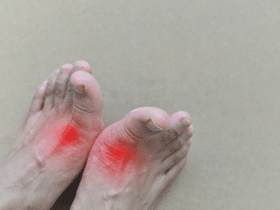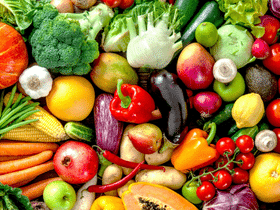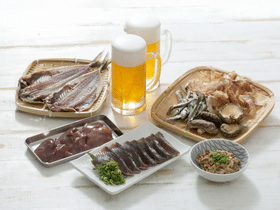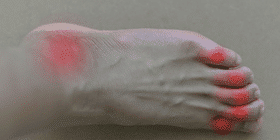Gout refers to a type of arthritis that is caused by too much uric acid in the bloodstream. In most cases, the kidneys can filter out the extra uric acid through the urine.
However, if too much uric acid remains in the body, it can form hard crystals in the joints.
These crystals can cause swelling and pain. The big toe is most often affected, but other joints can be affected too. A gout attack can come on suddenly, and cause a burning sensation that is extremely painful.
What Causes Gout?

Gout isn’t necessarily caused by a single factor. Uric acid is produced by the body, and it also comes from the diet.
As a result, many factors can lead to the build-up of uric acid that ultimately causes gout. These include:
- Being overweight or obese
- Having a blood or metabolic disorder
- Having a kidney and/or thyroid problem
- Certain types of medication; for instance, water pills (diuretics) and immunosuppressive fungal medications
- Drinking too much alcohol
- Eating a diet high in salt, red meat, organ meat, shellfish, and/or sweet drinks
- Being dehydrated
Signs and Symptoms of Gout
The most common symptom of gout is pain, tenderness, and swelling in the big toe. Such pain usually occurs at night.
Some people experience gout attacks in the foot, ankle, knees, or other joints. The first 36 hours are the most painful, but it may be up to 10 days before the pain goes away.
Sometimes, another attack doesn’t occur for months or years.
You should see your doctor even if the pain from a gout attack has subsided. The uric acid in the joints can still cause harm, even if you do not experience immediate pain.
Preventing Gout
There are a number of things you can do to prevent gout. These include:
- Limiting the amount of alcohol ingested
- Limiting salt, red meat, organ meat, shellfish, and/or sweet drinks
- Opting for a diet rich in fruits and vegetables
- Losing weight
- Quitting smoking
- Getting regular exercise
- Drinking enough water
You might have certain medical conditions or be taking medication that increases your risk of developing gout. If so, ask your doctor what you can do to reduce the risk of a gout attack.
Medication and Treatment
If you have gout, your family doctor can help to treat it. In severe cases, your family doctor might refer you to a specialist called a rheumatologist.
This type of doctor specializes in arthritis and related conditions.
Medication and treatments usually depend on your medical history, current health, and the severity of symptoms. Your doctor might prescribe medications, such as these:
- Colchicine, which can help reduce inflammation
- Non-steroidal anti-inflammatory drugs (NSAIDs) for joint inflammation and pain (e.g., aspirin, ibuprofen, naproxen)
- Corticosteroids for inflammation
- Medications such as allopurinol, which lowers the production of uric acid
Most doctors also recommend lifestyle changes that can help you prevent a future gout attack. These typically include:
- Reducing the amount of alcohol ingested
- Drinking lots of water
- Losing weight
- Quitting smoking
- Adjusting your diet
The Gout Diet

Gout has long been associated with the excessive consumption of meats, seafood, and alcohol. Historically, it tended to affect only the wealthiest individuals who could afford those things.
Before modern scientific research on gout, doctors understood that changing one’s diet was a key part of managing the disease.
Today, research has identified which foods can reduce symptoms of gout and which foods should be avoided.
Purine, a chemical substance found in the body and certain foods, has been connected to gout. When purine is broken down, uric acid is produced.
Not all foods with purines need to be avoided. In addition, certain foods can help control uric acid.
The goal of a ‘gout diet’ is to address the many factors that contribute to the disease, including being overweight or obese.
A healthy, balanced diet has the added benefit of preventing numerous other illnesses and diseases.
Talk to a doctor or nutritionist to find out more.
Good Drinks & Food for Gout
- Complex carbohydrates.
These include fruits, vegetables, and whole grains. Some vegetables are high in purines, but eating them does not increase your risk of a gout attack. Opting for a variety of complex carbohydrates is ideal.
- Water.
Stay hydrated to reduce the likelihood of a gout attack.
- Lean protein.
Low-fat or fat-free dairy products are a good source of protein that is associated with reduced uric acid levels.
- Coffee.
Some research has suggested that drinking a moderate amount of regular, caffeinated coffee per day can reduce your risk of gout.
However, coffee may have a negative impact on other health conditions. Speak with your doctor about how much you should drink.
- Cherries.
Some research suggests that eating cherries may help reduce your risk of gout.
- Vitamin C.
Vitamin C may help to lower uric acid levels. Talk to your doctor about whether a vitamin C supplement is appropriate for you.
Drinks & Foods to Avoid For Gout

Remember that not all foods with purine need to be avoided, but there are some foods you should avoid if suffering from gout.
Your doctor will assist you with understanding the foods and beverages to avoid, which are:
- Alcohol.
Drinking alcohol is believed to increase the production of uric acid. It also causes dehydration.
Some alcoholic beverages appear to produce stronger impacts than others: for instance, beer and distilled liquors have been observed to affect gout-related symptoms more consistently than wine.
- Organ and glandular meats.
You should avoid meat and meat products such as sweetbreads, liver, and kidney.
- Saturated fats.
Try to reduce your intake of saturated fats from red meats, fatty poultry, and high-fat dairy products.
- Certain types of seafood.
Avoid anchovies, mussels, scallops, haddock, sardines, herring, trout, tuna, and mackerel because they are high in purines.
Get more information about the different types of arthritis by learning the difference between seropositive and seronegative rheumatoid arthritis.
The information in this article should not be taken as professional medical advice. If you are having issues or have health-related concerns, you should see your personal physician
This page is also available in:
![]() Français
Français


